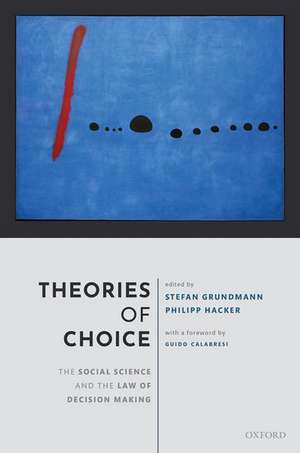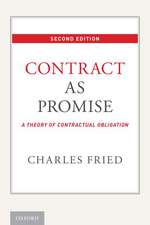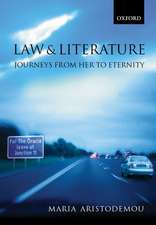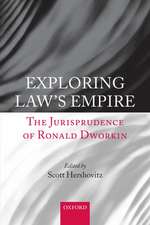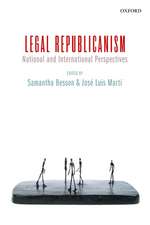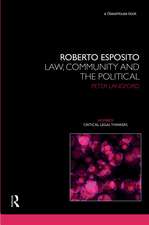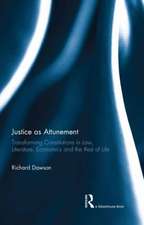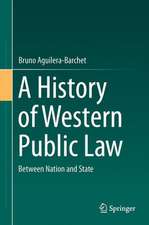Theories of Choice: The Social Science and the Law of Decision Making
Editat de Stefan Grundmann, Philipp Hackeren Limba Engleză Hardback – 14 ian 2021
Preț: 630.58 lei
Preț vechi: 851.82 lei
-26% Nou
Puncte Express: 946
Preț estimativ în valută:
120.68€ • 125.52$ • 99.63£
120.68€ • 125.52$ • 99.63£
Carte disponibilă
Livrare economică 14-20 martie
Preluare comenzi: 021 569.72.76
Specificații
ISBN-13: 9780198863175
ISBN-10: 0198863179
Pagini: 352
Dimensiuni: 164 x 240 x 24 mm
Greutate: 0.68 kg
Editura: OUP OXFORD
Colecția OUP Oxford
Locul publicării:Oxford, United Kingdom
ISBN-10: 0198863179
Pagini: 352
Dimensiuni: 164 x 240 x 24 mm
Greutate: 0.68 kg
Editura: OUP OXFORD
Colecția OUP Oxford
Locul publicării:Oxford, United Kingdom
Recenzii
This collection provides an in-depth discussion of the promises and perils of specific types of theories of choice. Moreover, it shows how the selection of a specific theory of choice can make a difference for concrete legal questions, particularly in the regulation of the digital economy or choosing between market, firm, or network.
This is a wide-ranging and hugely well-informed study of choice and its relationship with law and legal studies. The inclusion of responses to practical issues such as investor voting behaviour and networks of commercial contracts demonstrates a concerted attempt to link theory to practice. Any legal text that attempts interdisciplinary research (of sorts) with quantum physics is worth a look.
Choice is a foundational mechanism for every legal order in societies that are, politically, constituted as democracies and, economically, built on the market mechanism...The book provides an in-depth discussion of the promises and perils of specific types of theories of choice.
The book provides an in-depth discussion of the promises and perils of specific types of theories of choice... the volume provides an accessible overview of the current debates about rational versus behavioural approaches to theories of choice.
This is a wide-ranging and hugely well-informed study of choice and its relationship with law and legal studies. The inclusion of responses to practical issues such as investor voting behaviour and networks of commercial contracts demonstrates a concerted attempt to link theory to practice. Any legal text that attempts interdisciplinary research (of sorts) with quantum physics is worth a look.
Choice is a foundational mechanism for every legal order in societies that are, politically, constituted as democracies and, economically, built on the market mechanism...The book provides an in-depth discussion of the promises and perils of specific types of theories of choice.
The book provides an in-depth discussion of the promises and perils of specific types of theories of choice... the volume provides an accessible overview of the current debates about rational versus behavioural approaches to theories of choice.
Notă biografică
Dr. Stefan Grundmann, LL.M. (Berkeley), is a Professor of Transnational Law and Theory at the European University Institute (Florence) and Professor of Private and Business Law at Humboldt University Berlin. His major publications in several languages include overall treatises on European Company Law, European Contract Law, Banking and Capital Market Law, New Private Law Theory, and a host of articles in these areas, including transnational and interdisciplinary governance issues. He is editor-in-chief of the European Review of Contract Law, the Ius Communitatis series of textbooks, and president of the Society of European Contract Law (SECOLA), of the European Law School (Berlin/London/Paris/Rome/Amsterdam), and of the Theory section of the German Association of Comparative Law.Dr. Philipp Hacker, LL.M. (Yale) is a Professor of Law and Ethics of the Digital Society at the European New School of Digital Studies, located at European University Viadrina, and a Research Fellow at the Centre for Law, Economics and Society and at the Centre for Blockchain Technologies, both at University College London. Previous positions included an AXA Postdoctoral Fellowship at Humboldt University Berlin, a Max Weber Fellowship at the European University Institute and an A.SK Fellowship at the WZB Berlin Social Science Center. His research focuses on behavioral law and economics as well as the interplay between emerging technologies and the law.
